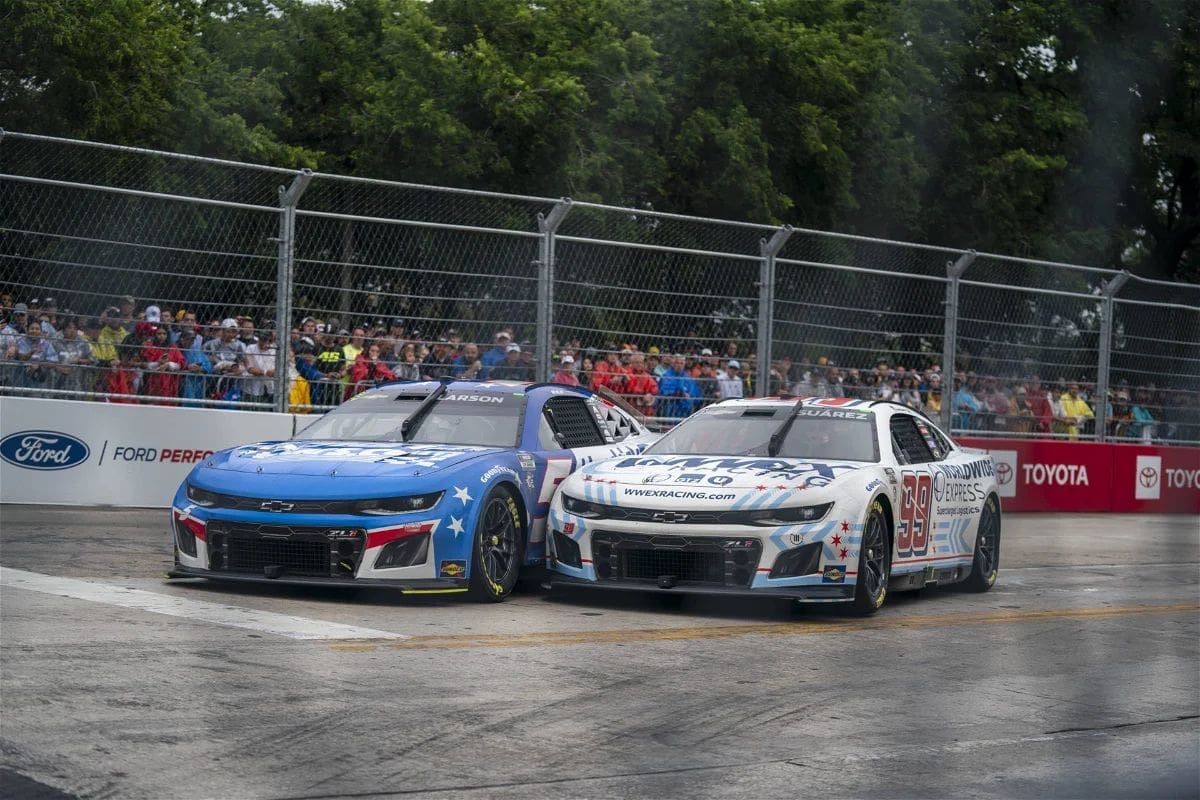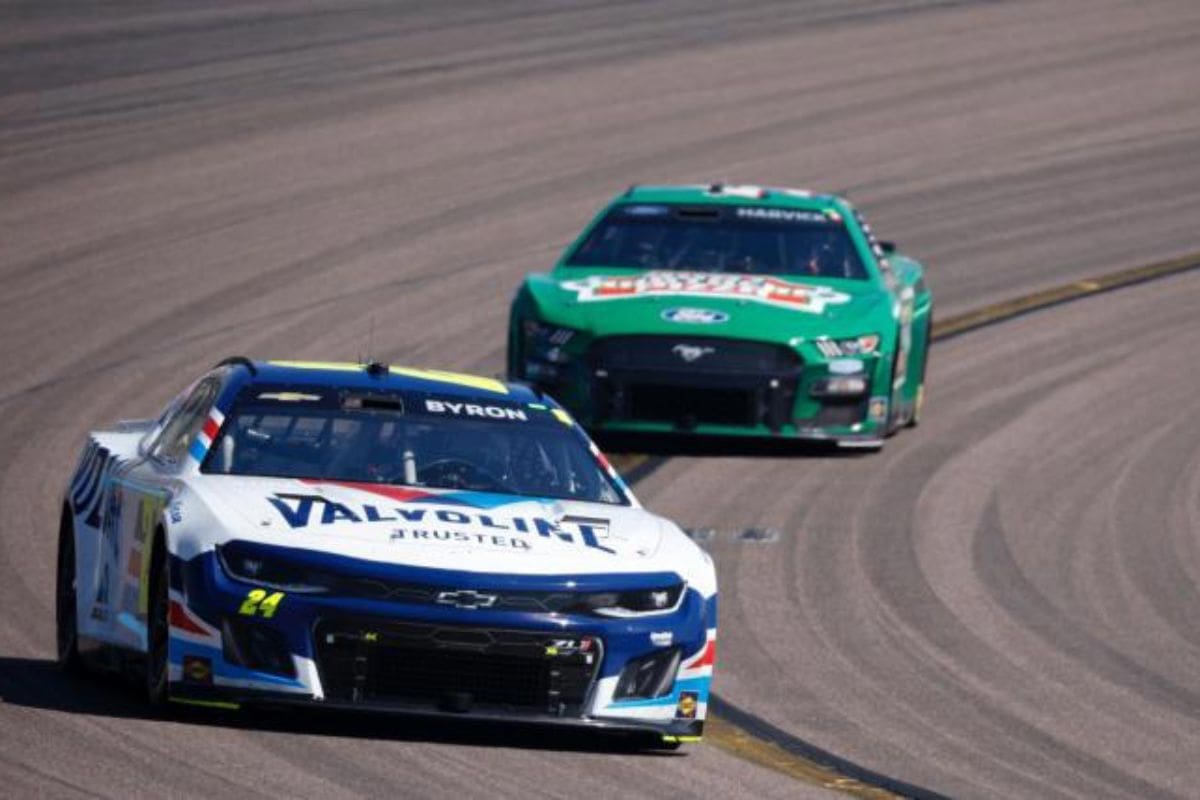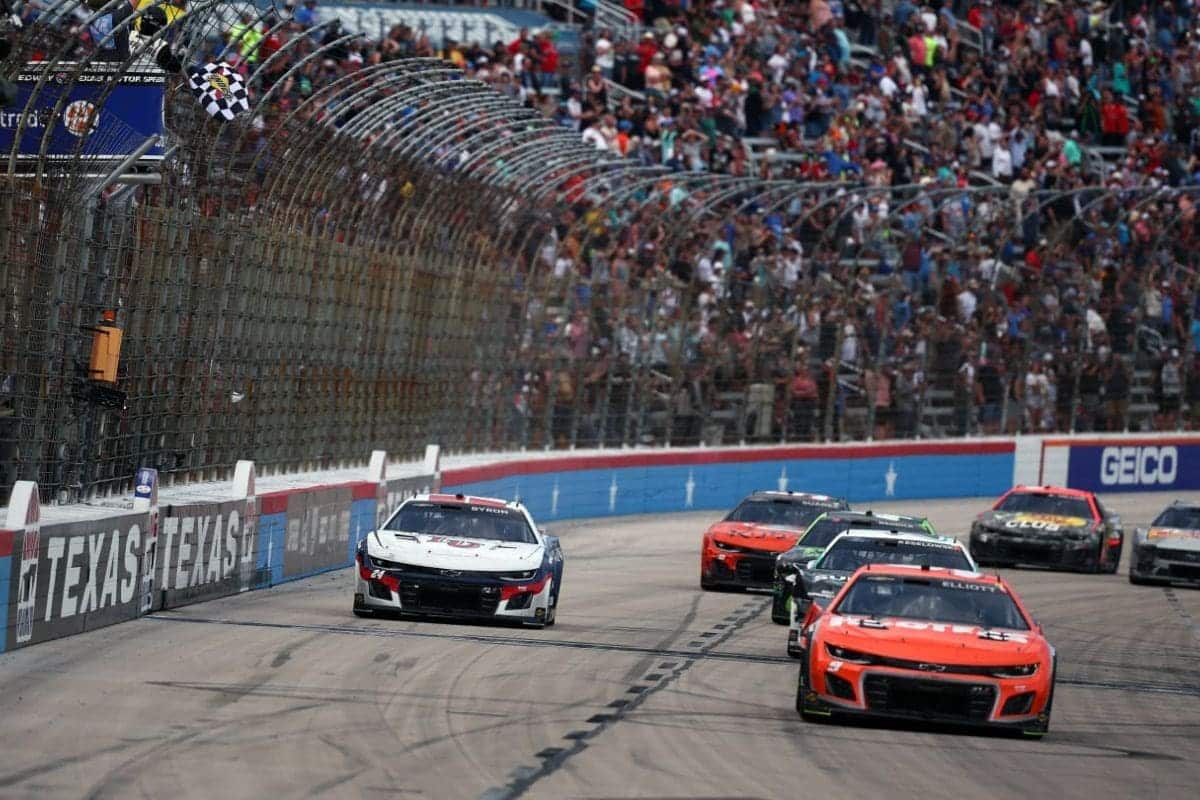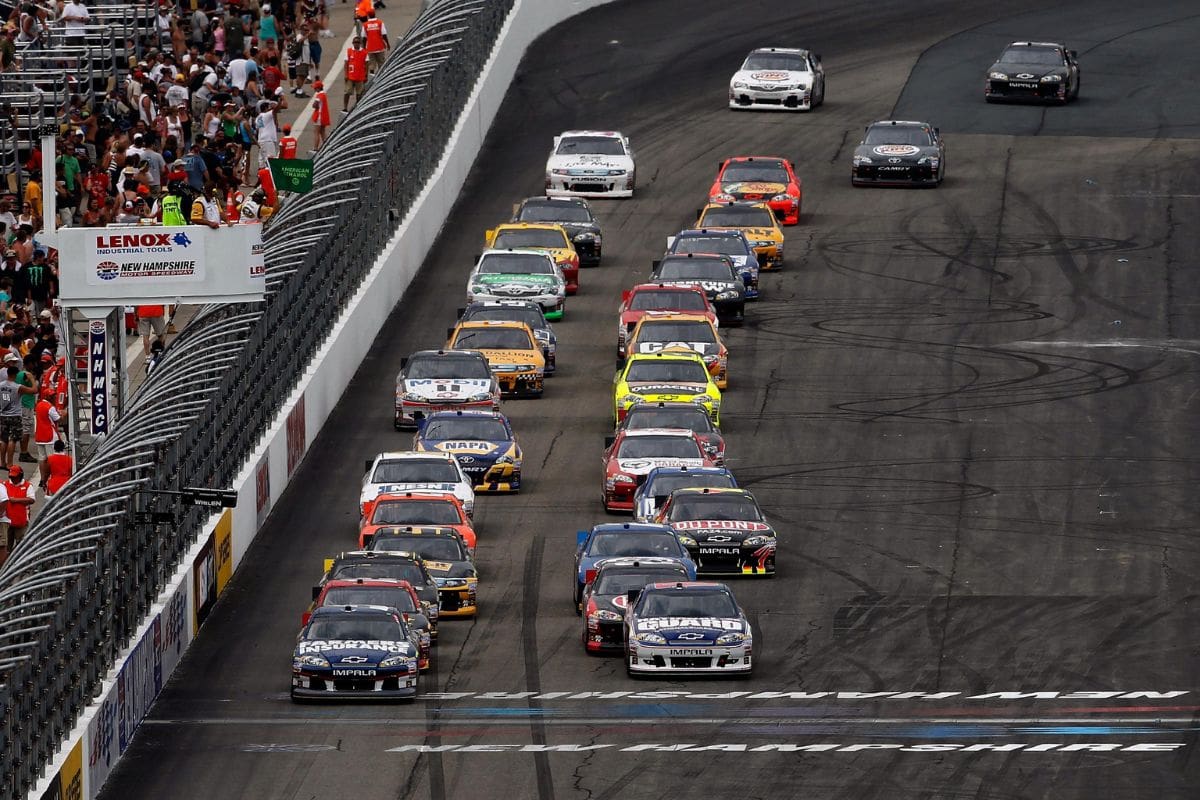Protesters Mock NASCAR’s Israeli Driver: The NASCAR Cup Series race in Chicago Street Course faced significant interruptions as protesters breached security at Turn 3, sparking a delay and creating chaos at the event. The demonstrators, who aimed to make a political statement and mocked Israeli driver Alon Day, posed immediate safety risks, prompting race officials to halt proceedings. This incident, compounded by adverse weather conditions, highlighted the complexities of maintaining order and safety during large-scale urban events. Analyzing the multifaceted challenges faced during this race offers a deeper understanding of the resilience required in motorsport management and the unpredictable nature of public events.
Key Highlights
- Protesters breached the fence and delayed the NASCAR Cup Series race in Chicago.
- Security swiftly removed protesters after they made a political statement at Turn 3.
- NASCAR officials halted the race for safety, compounded by light rain and bad weather.
- The race faced further delays due to mixed track conditions from ongoing inclement weather.
- The disruptions created a charged and unpredictable atmosphere, testing drivers, teams, and organizers.
Unexpected Protest Delays Race Start
As the engines roared to life for the start of the NASCAR Cup Series race on Chicago’s street course, an unexpected protest erupted, forcing officials to halt the proceedings immediately. The commotion was instigated by a group of protesters who had climbed the fence and handcuffed themselves to the barrier at Turn 3. This unforeseen disruption highlighted the unique challenges of hosting a racing event in an urban setting, where accessibility is markedly different compared to a traditional race track.
Unbelievable. https://t.co/l794mnMRDz
— Jeff Gluck (@jeff_gluck) July 7, 2024
In urban environments, the proximity of the racecourse to public spaces inherently increases the potential for such incidents. The ease of access for the general public, combined with the heightened visibility of the event, can attract individuals or groups looking to make a public statement. This incident proved to be a stark reminder of the vulnerabilities that come with street racing events, contrasting sharply with the more controlled environments of dedicated racing venues.
The officials’ swift response to order drivers to shut off their engines emphasizes the emphasis on safety and quick decision-making in the face of unexpected disruptions. This immediate action prevented any potential escalation and allowed security personnel to manage the situation efficiently. However, the intervention did not come without consequences. The resultant delay was compounded by subsequent weather conditions, necessitating further postponements to allow teams to equip their vehicles with wet weather tires.
Protests and Political Statements
The incident at Turn 3 not only disrupted the NASCAR Cup Series race but also highlighted the potent intersection of sports and political activism, as protesters utilized the event’s high visibility to broadcast their message against Illinois Governor J.B. Pritzker’s policies. The protesters, who managed to climb and chain themselves to the fence, were able to capture the attention of thousands of spectators and millions of viewers, creating a platform to air their grievances about the Governor’s alleged financial support for Israel’s actions in Gaza and the state’s prison policies.
This manifestation of dissent is symbolic of a growing trend where sporting events serve as stages for political statements. In this case, the protesters’ banners, which read ‘Pritzker: We charge genocide’ and ‘Bombs for Gaza, prisons for Illinois,’ were aimed at drawing parallels between local and international issues, suggesting a critical stance against the Governor’s allocation of state funds. Their actions highlight a broader narrative of using high-profile events to challenge political figures and policies, leveraging the media coverage that such events inevitably attract.
So protesters reportedly handcuffed themselves to the fence at the Chicago NASCAR race 🤦♂️
Let’s get crazy https://t.co/OLZo9ss3wH https://t.co/AkUCQ2jal9
— Trey Wallace (@TreyWallace_) July 7, 2024
The decision to target a NASCAR race, an event known for its extensive media coverage and large, diverse audience, was a strategic move. It made certain that the message reached beyond the immediate geographic and demographic confines of Illinois.
This incident serves as a case study in the effectiveness and risks of political activism in public spaces. While such actions can amplify significant messages, they also disrupt scheduled events and may polarize public opinion. The protest at Turn 3 thus mirrors the intricate dynamics of modern political activism within the world of sports.
Mocking Israeli Driver Alon Day
In a contentious move, the protesting group extended their disagreement by mocking Israeli driver Alon Day, who had openly supported his nation’s position in the Israel-Hamas conflict and encountered a crash during a practice lap. This ridicule was not simply an isolated act of mockery but was intertwined with a broader political message denouncing the perceived use of the NASCAR event as a platform for what the protestors termed ‘Israeli propaganda.’
A report from a Chicago city official of Gaza protestors causing a @NASCAR start delay
— Mary Ann Ahern (@MaryAnnAhernNBC) July 7, 2024
The protestors issued a statement criticizing the involvement of both Chicago city officials and NASCAR, accusing them of trying to ‘manufacture consent for Israel’s mass death campaign’ by highlighting Day, who they branded a ‘proud Zionist.’ This sharp critique indicates the protestors’ belief that Day’s participation was part of a larger strategy to legitimize or support Israeli policies through the cultural prestige of a high-profile sporting event.
Alon Day’s crash during a practice lap on Saturday added a layer of joy to the protestors’ narrative. They seized upon this incident to emphasize their disparaging remarks about Day’s racing abilities, suggesting that the intended propaganda effort had backfired due to his performance. The tone of the statement reveals a deliberate attempt to undermine Day’s professional reputation while also promoting their political agenda.
This situation highlights the complex interaction between sports and politics, as well as the extents to which activist groups will go to articulate their disagreement. The ridicule faced by Alon Day serves as a stark reminder of the polarizing effect that international political conflicts can have, even in arenas typically considered apolitical, such as professional sports.
Quick Action by Security and Weather Challenges
Swift action by security personnel was required when reports of protestors at Turn 3 prompted NASCAR officials to temporarily stop the race. The unexpected intrusion witnessed individuals breaching the fence and, in some cases, leaping onto the track itself. The protestors unveiled a banner pointing to Illinois Governor J.B. Pritzker, with the provocative term ‘Genocide‘ prominently shown, causing a significant commotion among attendees and requiring immediate intervention.
The quick reaction from NASCAR’s track security was praiseworthy. The staff promptly cordoned off the area, ensuring the safety of both drivers and onlookers. The timeliness of their response reduced potential risks and prevented further escalation of the situation. Shortly after, the protestors were removed, and the track was cleared for the race to continue. However, the unfolding incident had already caused confusion among the audience, as the pause was initially attributed to a ‘security issue,’ leaving many unaware of the specific reason for the disturbance.
This event highlights the challenges of managing large-scale gatherings in urban areas, where various agendas and spontaneous actions can intersect unexpectedly. The ability of security teams to react swiftly to such disruptions is crucial in upholding the integrity and smooth running of major sporting events like NASCAR.
Further complicating matters was the looming threat of bad weather. Despite the race being delayed prior to the rain’s arrival, the subsequent heavy rain made it difficult to promptly resume the event. The rapid sequence of security and weather-related delays tested the resilience and coordination of the organizing teams, emphasizing the need for robust contingency planning in the face of diverse challenges.
Weather Interrupts Again
Following the swift removal of protestors from the track, Mother Nature added to the day’s challenges by introducing a light but disruptive rain, further complicating the race proceedings. NASCAR officials quickly initiated a temporary hold to manage the inclement weather. The sporadic rain created a dichotomy on the track, leaving some areas wet while others remained dry, presenting a tactical conundrum for drivers and their teams.
In response, NASCAR allowed drivers to take a pace lap around the circuit to evaluate the track conditions. This assessment was critical as it informed the teams’ decisions regarding tire selection. With the availability of both wet weather tires and slicks, teams had to weigh the benefits and risks of each option attentively. The mixed track conditions demanded a keen understanding of both the vehicle dynamics and the evolving weather patterns to optimize performance and safety.
The intermittent rain highlighted the unpredictable nature of outdoor motorsport events, particularly in a city like Chicago known for its capricious weather. The light drizzle, though not as severe as the eight-inch downpour experienced last year, was enough to introduce an element of unpredictability and complexity to the race. This situation necessitated heightened vigilance and adaptability from all participants.
As fans anxiously awaited the resumption of the race, the atmosphere was charged with anticipation. The weather-induced delay, coupled with the recent protestor incident, set the stage for what could be a thrilling and unpredictable contest. The combination of strategic tire choices and the ever-changing track conditions promised a race that would test the drivers’ skill and the teams’ strategic insight to the fullest.
News in Brief: Protesters Mock NASCAR’s Israeli Driver
The NASCAR Cup Series race in Chicago faced significant disruptions due to an unexpected protest and adverse weather conditions. The protest, which included political statements and the mocking of Israeli driver Alon Day, called for swift action by security personnel and resulted in a temporary halt of the race.
These occurrences highlighted the complexities and challenges of managing large-scale urban events, emphasizing the importance of robust contingency planning to guarantee the safety and integrity of such proceedings.
ALSO READ: All-Time Great Crew Chiefs in NASCAR Cup Series History




